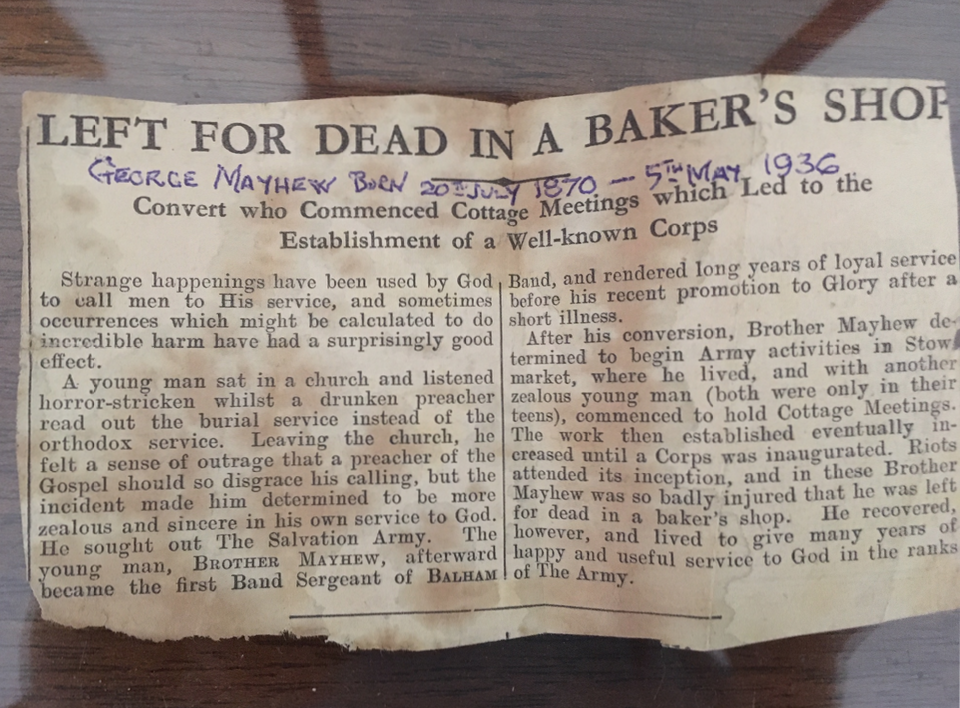Faith in Action: Becoming a True Musterbrecher!
by Will Powell, Guest Author
What does the Bible tell us about putting what we believe, and what do we understand about God’s Guidance into action? Considering James 1:1-4, 19-27.
James, the brother of Jesus, who obviously received a lot of respect in the early Church, was able to write his letter with authority “to the 12 tribes.” Although he was not a disciple prior to Jesus crucifixion, Jesus appeared to him after his resurrection, and he became close to Peter so that in Acts 15 we see James helping to resolve what to do about Gentile Christians. This is a very clear example of the kind of man James was: intensely practical. And exactly this aspect of his character is what comes over so clearly in this letter.
A Call to Persevere
Last year, I had signed up for a course, which I, sadly, could only partially attend. But what I did get out of it was very good. It was called “Musterbrecher”—literally, pattern-breakers. The main thrust of that training was to encourage participants to get out of their daily treadmill, and think differently about the problems they face. There were a lot of examples not just of companies, but also of a town mayor of Curitiba who managed to turn things around for the people in his town. One of the main messages I gained from the training was to learn to “turn the game on its head.” I mention this, because much of the first 18 verses of James 1 is about turning the situations we find ourselves in on their heads–by viewing them from God’s perspective. Let’s try to use James’ advice to gain God’s view of our situations.
James invites his readers to view their trials as pure joy. Sadly, he doesn’t give us many tips on how to do that. But he does give us more clues about what sort of trials we will face. He is not specific about the types of trials, but he recognizes there will be a lot of them. Some of our trials will simply be our human condition—suffering in our bodies, struggles at home or our work. James recognizes that as Christians we will struggle not only in these ways, but our trials will also be extended to our faith. As our entire world view is based on our faith, when this is tested, it is a trial which goes to our very core. We can become not only down or depressed, but if we give up and become despondent, the framework for our whole life is called into question. This special type of trial, reserved for the faithful has a specific purpose in James view: for perseverance.
What is that purpose–and one space removed, the purpose of the trial? Simply, to bring forth maturity. James recognises that our maturity as Christians does not come solely as a gift on our conversion. It is not that we need to do anything more to attain God’s acceptance—Jesus has done it all. But we do need to ensure we do not “lack anything” to become “complete” as a Christian. This means that when facing all trials–whether in body or in our minds –we remain faithful, understanding that whatever the trial, God is always going to be there for us. It is exactly as our Pastor John wrote for us: keeping Jesus at the centre of our lives ensures our relationship with God remains strong—even in death. So let us take joy from our situations, even when things get hard, knowing God is by our side, and keeping us on the road to eternity with him.
There are other examples of how James turns our normal way of thinking on its head in the following verses. Let us look at James’ advice for putting our faith into action from verse 19 onwards.
The Righteous Life: Be Pure
In this section (v19-21), James asks his readers to follow the “righteous life which God desires.” It is his call to be pure. He does not directly even mention this abstract concept of purity. He is much more interested in how to achieve purity practically. Let us look together at what being “pure” looks like in real-world situations.
Firstly, he recognizes that anger, or even frustration, is often born out of two behaviours we should be careful to maintain. The first is a positive: listen. If you want to know more about how to practically listen, do look at a TED talk given by Evelyn Glennie on YouTube. It is, of course, about drums and listening to music. But the lessons about listening from a deaf person are profound and apply also to how we listen to each other. For the most part, the lesson to me is that we cannot listen to others until we open ourselves up first. And that seems to be the other side of what James is saying here: if we are still trying to control by speaking, then we are not listening. We are not open to what someone else is saying. It is no wonder our lack of openness leads to frustration and ultimately to anger. We are different, and will have different views and opinions. We can’t listen if we speak too soon. And if our attitude is not open, we will become frustrated, and angry. James is keen we tame our tongue (also in Chapter 3), because when our tongue is tamed so also is our anger.
The next section is more obviously about purity: James wants the church to “get rid of all moral filth, and the evil which is everywhere” (v. 21). I don’t need to remind you about all manner of behaviours we see, often from people in power, or just famous people which show how impure their motives are. Accusations of bribery surround governments. Obvious posturing showing the attitude that “what’s in it for me” is clearly the way some people behave. But James immediately gives us the antidote to these attitudes: to “humbly accept the word planted in you.” When we accept this word, our attitude changes. We are miraculously able to follow what God desires and walk differently from those around us. Purity becomes possible. And, because it becomes possible, this word has the power to save us.
Put the Word into Practice
But James doesn’t stop here. He wants his readers to understand that just having the word—knowing it, and maybe even listening to it, is not enough. We have to put it into practice. To know something in theory but then not to do it is a deception about our true knowledge. I would more naturally go back to music to talk about doing—putting things into practice. How do you hold (or not hold) a drum stick? Just knowing that isn’t enough if you really want to play the drums. You have to do it: learn how not to hold too tightly, learn the weight of the stick, and so forth.
James knows that not everyone is so fanatical about music as me! He chooses a different parallel for our lives: the mirror! If we forget what we look like as soon as we stop looking at the mirror, what use was it to look into the mirror in the first place? His encouragement is to look into the mirror intently, but he shows us the true mirror is the perfect law. And what is the perfect law? Jesus! James’ encouragement is to look intently at Jesus because this helps us to see what we should look like. If we align our lives with this image, there is a promise: we will be blessed in all we do.
The last verses of Chapter 1 show us even more directly what our Christian lives should look like. First, our “religion” should be characterized by a close check on our tongues. Whilst in listening, we should be open and accepting, the reason for the particular focus on what we say (and how we say it) is because our words direct what we, and others, do. We can build up and destroy with the same part of our bodies. Therefore, part of what we do to “keep our whole body in check” (Ch 3) should be to ensure we think carefully about what we say (and what we withhold), as well as how we say it.
Finally, when we really put our faith to work, we see that charity should be a big part of what we are doing. “Purity in practice is this: look after widows and orphans, and keep yourself from being polluted by this world.” Why does James single out widows and orphans? These are the weakest members of society with no-one to defend them or hold up their cause. They constantly need support and encouragement. It is the practice of our faith to do to them as if we were doing it to or for Jesus.
Recalling that we should Persevere in our trials to work towards Purity and put into Practice the word planted in us, I want to add “three Bs” to the “three Ps.”. They are the “Balham Band Brother.” They are not in the Bible so don’t look for them there!
 When I was at my parents, I was going through some old draws—various old photos and some possessions from my Grandfather—in the room where we were sleeping. In one of the draws, there was a wallet, and in the wallet was what looked like an old newspaper cutting. It was an obituary with my Grandfather’s handwriting, “George Mayhew born 20th July 1870 – 5th May 1936.” It outlines the life of my great-grandfather who looked intently to Jesus. Because of this, he was incensed that a vicar was so drunk that he went through the burial service instead of a normal service. In response, my great-grandfather started “Cottage meetings” in his hometown of Stowmarket. This became the Salvation Army in Stowmarket. But his action had consequences—putting his faith into practice meant he risked his life, being beaten up by the locals. But that work was blessed, and today there still is a Salvation Army in Stowmarket.
When I was at my parents, I was going through some old draws—various old photos and some possessions from my Grandfather—in the room where we were sleeping. In one of the draws, there was a wallet, and in the wallet was what looked like an old newspaper cutting. It was an obituary with my Grandfather’s handwriting, “George Mayhew born 20th July 1870 – 5th May 1936.” It outlines the life of my great-grandfather who looked intently to Jesus. Because of this, he was incensed that a vicar was so drunk that he went through the burial service instead of a normal service. In response, my great-grandfather started “Cottage meetings” in his hometown of Stowmarket. This became the Salvation Army in Stowmarket. But his action had consequences—putting his faith into practice meant he risked his life, being beaten up by the locals. But that work was blessed, and today there still is a Salvation Army in Stowmarket.
My great-grandfather also became Band Sergeant for the Salvation Army in Balham. His example, and the example of the Salvation Army, are a reminder to me of how I should be “doing” more—caring for the weak and living according to my own family’s example. Here is someone who really was a Musterbrecher! I’m sure you have examples, too–both, inside or outside your families—let us look to them as reflections of Jesus as we attempt to look intently to him in all we do.
Looking to Jesus, the founder and perfecter of our faith, who for the joy that was set before him endured the cross, despising the shame, and is seated at the right hand of the throne of God. -Hebrews 12:2
Photo credit: Salvation Army, Stowmarket







